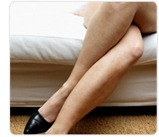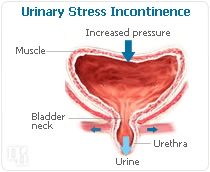
Urinary incontinence is not one of the most common menopause symptoms women can suffer from, however it is one of the most embarrassing and difficult to control. This condition can occur as levels of the estrogen hormones commonly found in the ovaries drop as a woman reaches the end of her reproductive cycles. Estrogen Hormones can be added to the body in the form of hormone replacement therapies and although this treatment can help women with hot flashes, night sweats and vaginal dryness little research has been undertaken into the benefits or risks estrogen hormones can have on urinary incontinence.
As part of the Women's Health Initiative a placebo-controlled randomized clinical trial was undertaken with 27,347 post menopausal women. Of this group 23, 296 women were known to have some degree of urinary incontinence as one of a host of menopause symptoms they were suffering from during this period. All the women involved were between the ages of 50 and 79 and they were split randomly into two placebo groups and groups taking the active estrogen hormones. The different types of hormone groups included progesterone plus estrogen hormones and estrogen hormones alone. Out of the large group of subjects who took part in this study 8506 received estrogen hormones combined with progesterone while 8102 received the placebo for this combination. A further 5310 received only the estrogen hormones while the placebo group for this treatment consisted of 5492 women.

The aim of this study was to identify the changes in the conditions of the women who suffered from urinary incontinence as one of a host of menopause symptoms and also to monitor the urinary function of those women who did not suffer from problems at the start of this study. Researchers were also interested in how the introduction of progesterone and estrogen hormones influences such menopause symptoms over the course of a year.
The results of this study demonstrate that the problems of urinary incontinence are increased with the use of hormone replacement therapies based in estrogen hormones. The women who were taking hormone therapy medication had a higher risk of developing urinary incontinence, whether or not they have previously suffered from it. The women who took the supplementary estrogen hormones, either combined with progesterone or alone, reported that urinary incontinence was one of the menopause symptoms which disturbed their daily lives the most.
It's also interesting to note that the type of urinary incontinence a woman suffers from as a result of menopause symptoms makes a difference on the effect hormone therapies can have on her bladder function. Researchers found that the condition of women suffering from stress related urinary incontinence worsened with the introduction of foreign estrogen hormones, while those that suffered from other forms of urinary incontinence were not as badly affected.
This research gives clear results that the use of estrogen hormones in the fight against menopausal and postmenopausal symptoms can lead to urine incontinence in those women who have previously had little problem with their bladder. Symptoms of women already having problems with this condition can worsen substantially with the long term use of estrogen hormones and women need to think clearly about the effects unfamiliar estrogen hormones can have on their bodies before deciding to undergo this type of treatment.